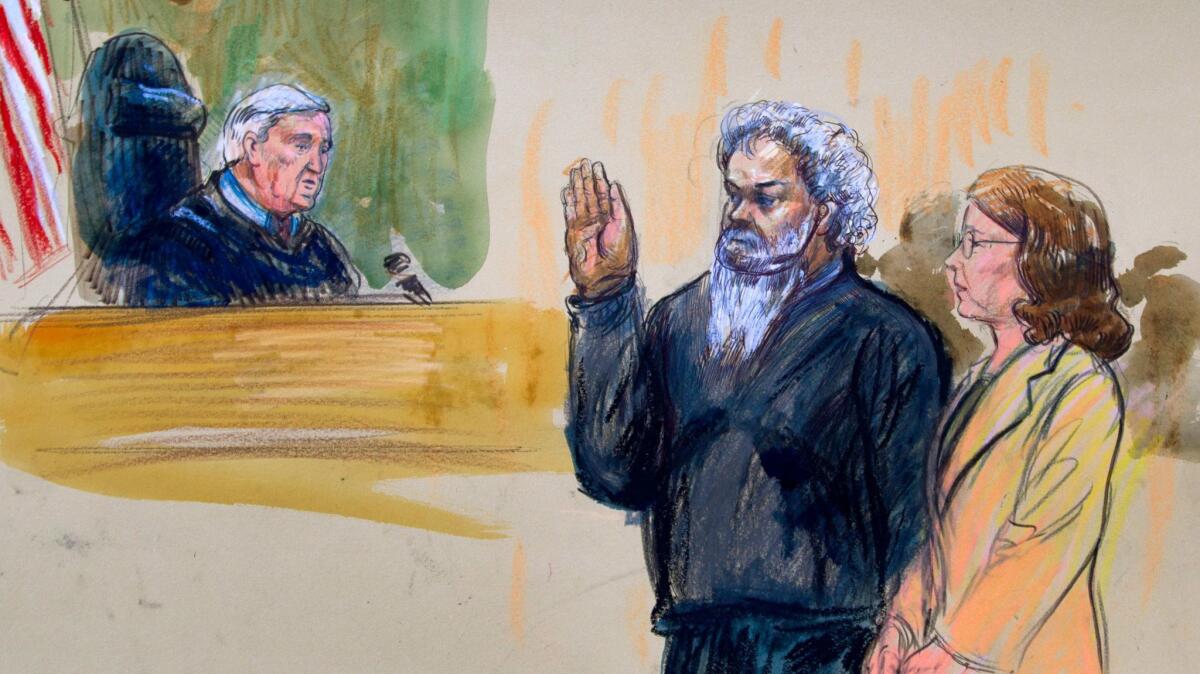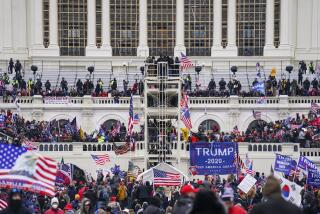Trial begins for Libyan militia leader accused of planning attacks in Benghazi that killed four Americans

Reporting from Washington — The terrorism trial of the man accused of directing the deadly Benghazi attacks opened Monday with federal prosecutors showing dramatic security camera videos and portraying Ahmed Abu Khatallah as an Islamic extremist who hated Americans “with a vengeance.”
Khatallah is charged with 18 criminal counts, including murder and providing support to terrorists. He is accused of helping plan or incite the militia attacks that killed four Americans, including U.S. Ambassador J. Christopher Stevens, on Sept. 11, 2012.
The attacks became a focal point for Republican anger at then-Secretary of State Hillary Clinton. She subsequently took responsibility for security lapses at the lightly guarded diplomatic compound where Stevens was killed.
Assistant U.S. Atty. John Crabb Jr. began the jury trial by reciting the names of the four dead Americans, saying that Stevens and the embassy’s information officer, Sean Smith, were “choked to death by thick black smoke” after they were trapped by a fire set by the militants.
Glen Doherty and Tyrone Woods, both former Navy SEALs working as CIA contractors, were killed several hours later in a mortar attack on a CIA annex a mile away.
“Why? Because they were Americans, and that man right there, the defendant, Abu Khatallah, hates Americans with a vengeance,” Crabb said.
He played security camera videos recovered from the compound that showed militants running in with automatic weapons and a gas can that was used to set fire to several buildings.
The gray-haired Khatallah, 46, with a chest-length beard and a white dress shirt, sat quietly at the defense table. If convicted, he faces a maximum of life in prison.
Prosecutors acknowledged that Khatallah did not set the fires or fire the mortars. They said he helped plan the attacks, however, and was motivated by a radical Islamist ideology and anger at America.
“You’ll hear that Abu Khatallah thinks that America is the root of all the world’s problems,” Crabb said. Before the attacks, Khatallah stood at a meeting at a mosque and said the mission was being used by American spies, Crabb said.
“He challenged the other extremists. He said ‘How can this be?’ He said, ‘How can we allow spies among us?’”
After the attacks, Crabb said, Khatallah bragged he “would have killed all the Americans that night if others had not stopped me.”
Khatallah’s defense lawyer argued that his client was more of a fall guy than a mastermind, saying that he arrived at the U.S. compound after the battle was over.
“By the time he got there, the gates were open, the guards were gone, the Americans had left,” said attorney Jeffrey D. Robinson.
“He didn’t attack anyone,” he added. “He didn’t shoot anyone. He did not set any fires. He did not participate in the attack.”
Robinson said a cooperating witness who led Khatallah to the villa where he was captured by U.S. special forces, identified only as “Ali,” was paid $7 million by the U.S. government.
He said Khatallah was simply a “soft target,” unlike other extremists who went into hiding after carrying out the attacks.
“There are people who weren’t Ahmed Abu Khatallah who were the brains behind the attack,” Robinson said. He added that he can’t say much about them because the information is classified.
Khatallah was a leader of the Ansar al Sharia militia, which was formed to oppose Libyan strongman Moammar Kadafi, and he was imprisoned for part of the dictator’s rule. After the 2012 attack on the U.S. compounds, Khatallah lived openly in Benghazi and even gave media interviews.
A joint U.S. military and FBI team grabbed him in June 2014 and took him to a Navy transport ship offshore, where he was questioned by two teams of investigators.
A team of intelligence agents first asked about his knowledge of militia groups and possible plots. The FBI then conducted a second interrogation, after Khatallah had waived his right to keep silent.
The ship took nearly two weeks to arrive in Virginia after developing engine trouble at sea, according to pretrial testimony.
The defense tried to have Khatallah’s statements thrown out of court, saying he was kept in isolation during the long voyage and that the two-step interrogation was an improper way to evade rules of criminal evidence.
U.S. District Judge Christopher Cooper denied those requests, saying Khatallah was well treated aboard the ship and that the two-step process did not abuse his rights.
The trial is expected to take about five weeks. It is the first major terrorism trial under President Trump, who had vowed during the campaign last year to send terrorism suspects to the military prison at Guantanamo Bay in Cuba.
The Trump administration has not said whether it plans to try new terrorist captives in civilian courts, or resume sending them to Guantanamo, which now holds just 41 detainees.
Twitter: @jtanfani
ALSO
Two women plead not guilty in death of North Korean leader’s estranged half brother
Amid scenes of chaos and violence, Catalonia independence vote is projected to pass overwhelmingly
Islamic State releases purported new audio message from top leader vowing to continue fight
More to Read
Get the L.A. Times Politics newsletter
Deeply reported insights into legislation, politics and policy from Sacramento, Washington and beyond. In your inbox three times per week.
You may occasionally receive promotional content from the Los Angeles Times.











